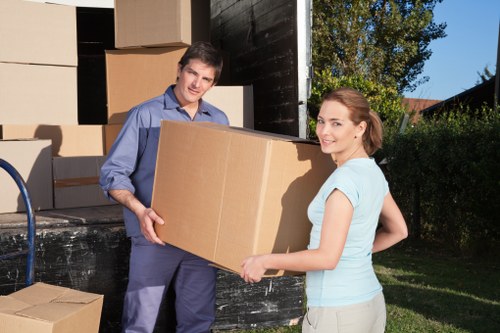Comprehensive Guide to Council Waste Collection Ware

Managing household waste is a crucial responsibility for every resident, and council waste collection services play a vital role in maintaining the cleanliness and hygiene of our communities. Council Waste Collection Ware encompasses a range of tools and containers designed to make the process efficient and environmentally friendly.
Understanding the different types of waste collection ware available can help residents comply with local regulations and promote effective waste segregation. From recycling bins to compost containers, each type of ware has a specific purpose in the waste management system.
In this article, we will explore the various aspects of council waste collection ware, including their types, usage guidelines, and the benefits they offer to both the environment and the community.

Types of Council Waste Collection Ware
Council waste collection systems typically include several types of ware to handle different kinds of waste. These are designed to facilitate the proper segregation and disposal of waste materials.
1. General Waste Bins: These are used for non-recyclable household waste. They are usually collected once a week and are essential for disposing of items that cannot be recycled or composted.
2. Recycling Bins: Recycling bins are designated for recyclable materials such as paper, plastic, glass, and metal. Proper use of these bins helps reduce landfill waste and conserve natural resources.

Recycling Collection Services
Recycling collection is a cornerstone of effective waste management. Council-provided recycling bins are essential for ensuring that recyclable materials are properly sorted and processed.
Residents are encouraged to separate their recyclable items from general waste. This not only supports environmental sustainability but also helps councils reduce the volume of waste sent to landfills.
In addition to standard recycling bins, some councils offer specialized containers for specific materials like electronic waste and hazardous materials, ensuring safe disposal and recycling processes.

Innovative Waste Collection Ware
With the growing emphasis on sustainability, many councils are adopting innovative waste collection ware to improve efficiency and reduce environmental impact.
Smart Bins: Equipped with sensors, smart bins can monitor waste levels in real-time, allowing for optimized collection routes and schedules. This not only saves resources but also ensures timely waste collection.
Compost Containers: For organic waste, compost containers provide a means for residents to recycle food scraps and garden waste, contributing to the production of valuable compost for use in agriculture and gardening.

Benefits of Proper Waste Collection Ware
Using council-provided waste collection ware brings numerous benefits to both the community and the environment.
- Environmental Protection: Proper segregation and recycling reduce the strain on natural resources and decrease greenhouse gas emissions from waste decomposition.
- Public Health: Effective waste management prevents the spread of diseases by ensuring that waste is collected and disposed of regularly.
- Community Aesthetics: Clean and well-maintained streets enhance the overall appearance of neighborhoods, making them more pleasant places to live.
- Cost Efficiency: Optimized waste collection routes and schedules can lead to cost savings for local councils, potentially translating into lower taxes or improved services for residents.
Moreover, proper waste management practices foster a sense of community responsibility and encourage individuals to adopt more sustainable lifestyles.

Guidelines for Using Waste Collection Ware
To maximize the effectiveness of council waste collection ware, residents should adhere to specific guidelines.
- Segregate Waste: Separate recyclable materials from general waste to ensure proper processing and recycling.
- Use Appropriate Containers: Utilize the correct type of bin for each category of waste. For instance, use compost containers for organic waste and recycling bins for recyclables.
- Follow Collection Schedules: Be aware of your area's collection days and ensure that bins are placed out on time.
- Maintain Cleanliness: Keep bins clean and free from excessive waste to prevent odors and attract pests.
- Dispose of Hazardous Materials Properly: Use designated containers for hazardous waste to ensure safe disposal.

Local Relevance: Surrounding Areas of Ware
Effective council waste collection services extend beyond Ware, encompassing several nearby areas. Each locality benefits from tailored waste management solutions that cater to its unique needs.
- Knebworth: Located just north of Ware, Knebworth has access to regular recycling services and specialized collection for bulky items.
- Harpenden: This nearby area emphasizes composting organic waste, providing residents with compost containers as part of their waste collection ware.
- Hertford: Hertford benefits from smart waste collection systems, including sensor-equipped bins that optimize collection routes.
- Royston: In Royston, residents have access to electronic waste collection points to ensure safe disposal of old electronics.
- Stevenage: Stevenage supports a robust recycling program, with extensive public awareness campaigns to encourage waste segregation.
- Welwyn Garden City: This area offers comprehensive waste management services, including hazardous waste disposal facilities.
- St Albans: St Albans features innovative waste collection ware, promoting the use of smart bins and compost containers.
- Bishop's Stortford: Bishop's Stortford provides accessible recycling centers and regular waste collection schedules to its residents.
- Hatfield: Hatfield focuses on reducing landfill waste through effective recycling and composting programs.
- Henley-in-The-Thames: This picturesque area emphasizes community involvement in waste management, encouraging residents to actively participate in recycling initiatives.

Challenges in Council Waste Collection
Despite the benefits, council waste collection services face several challenges that need to be addressed to ensure their effectiveness.
Illegal Dumping: Unauthorized disposal of waste can undermine recycling efforts and lead to environmental degradation.
Funding Constraints: Limited budgets can restrict the ability of councils to invest in advanced waste collection infrastructure and services.
Public Awareness: Ensuring that all residents understand and comply with waste segregation guidelines is an ongoing challenge that requires continuous education and outreach.

Future of Council Waste Collection Ware
The future of council waste collection ware is geared towards sustainability and innovation. Advances in technology and increased environmental awareness are driving changes in how waste is managed.
Automation and AI: The integration of artificial intelligence in waste collection ware can enhance sorting accuracy and operational efficiency, reducing human intervention and errors.
Eco-friendly Materials: Developing bins and containers from sustainable materials reduces the environmental footprint of waste collection ware itself.

Community Involvement and Education
Engaging the community is essential for the success of council waste collection services. Education initiatives and community programs can significantly improve participation rates in recycling and waste reduction efforts.
Workshops, informational campaigns, and school programs can raise awareness about the importance of proper waste segregation and the role of council waste collection ware in environmental conservation.
Moreover, involving residents in community clean-up events fosters a sense of ownership and responsibility towards maintaining a clean and sustainable environment.
Conclusion
Council waste collection ware is a fundamental component of effective waste management systems. By understanding the different types of ware, adhering to usage guidelines, and participating actively in recycling and waste reduction initiatives, residents can contribute to a cleaner, healthier, and more sustainable community.
As councils continue to innovate and improve waste collection services, the collaboration between local authorities and residents will be key to overcoming challenges and achieving long-term environmental goals.
Frequently Asked Questions
1. What is Council Waste Collection Ware?
Council Waste Collection Ware refers to the various containers and tools provided by local councils to facilitate the efficient and environmentally friendly collection of household waste.
2. How often is waste collected by the council?
Waste collection schedules vary by location, but typically, general waste and recyclables are collected weekly. It's best to check with your local council for specific collection days.
3. Can I put electronic waste in my regular recycling bin?
No, electronic waste should be disposed of through designated collection points or special recycling programs to ensure proper handling and recycling of hazardous materials.
4. What should I do with bulky items like furniture?
Bulky items usually require special collection services. Contact your local council to arrange a pickup or find out about designated drop-off locations.
5. How can I reduce the amount of waste I produce?
You can reduce waste by reusing items, buying products with less packaging, composting organic waste, and recycling as much as possible. Adopting these practices helps minimize your environmental impact.
Frequently Asked Questions
A comprehensive guide on Council Waste Collection Ware, covering types, usage, benefits, local areas near Ware, challenges, future innovations, and community involvement to promote effective waste management.
Get A QuoteGet In Touch With Us.
Please fill out the form and we will get back to you as soon as possible.